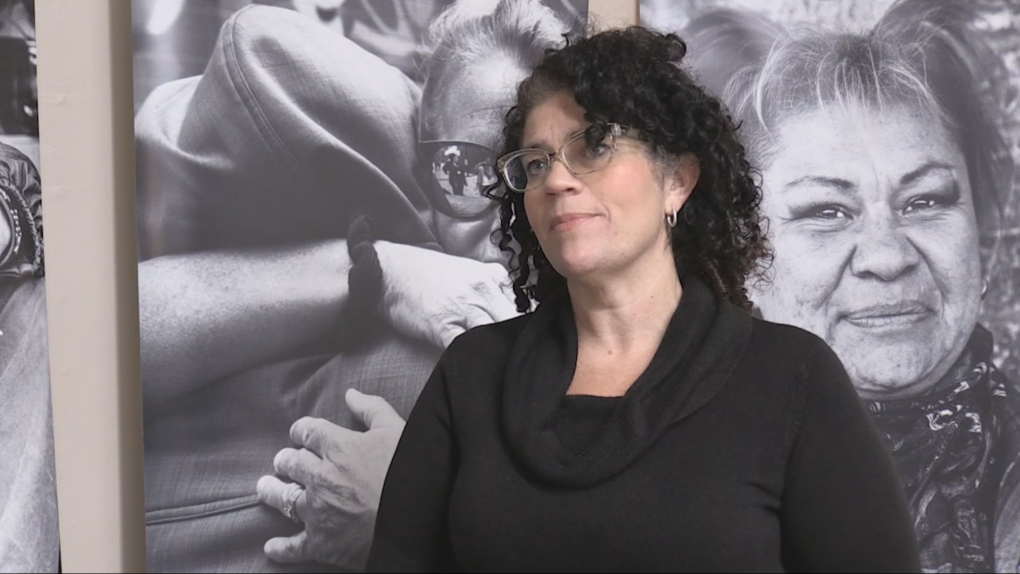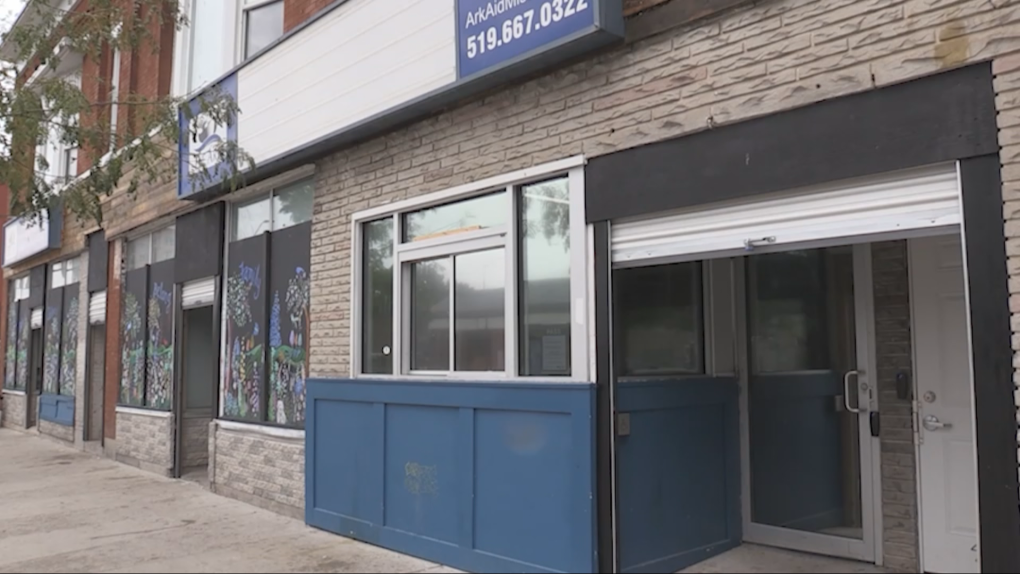'I'd just end up on the street somewhere': Disabled Londoner fears impact of council's new restriction on indoor resting spaces
City council has forbidden the use of new federal funding to operate resting spaces for homeless Londoners if they’re located on the main street of a Business Improvement Area (BIA).
The decision has potentially put 30 overnight beds in jeopardy.
On Thursday, CTV News spoke with 42-year-old Jess, who visits Ark Aid Street Mission on Dundas Street each morning to get her name on a list for one of those resting spaces.
“I really like it here,” she said while clutching a stuffed animal close to her face,” I… I have nowhere else to go.”
She began to sob.
Earlier this week a motion by Councillor Susan Stevenson was supported by the majority of council that any new resting spaces receiving funds from the upcoming $250 million federal encampment program, “not be located on the main street of any Business Improvement Area (BIA).”
A statement from Civic Administration reads, “This would include daytime and overnight resting spaces such as the CMHA Coffee House on Hamilton Road (Council approved continuing funding through May of 2025) and The Ark on Dundas Street (Council has approved funding through to end of December 2024).”
“It's too early for me to say if I can fundraise enough money or how we would continue to operate night-time space,” explained Sarah Campbell, Executive Director of Ark Aid Street Mission. “But I do know that we will be here in whatever scale and capacity our organization is able to offer to the people from the streets of London.”
 Sarah Campbell, Executive Director of Ark Aid Street Mission, speaks with CTV News on November 7, 2024 (Daryl Newcombe/CTV News London)
Sarah Campbell, Executive Director of Ark Aid Street Mission, speaks with CTV News on November 7, 2024 (Daryl Newcombe/CTV News London)
However, demand for resting spaces already exceeds the existing capacity - most nights people are turned away.
“I’d rather be somewhere warm instead of cold,” explained Jess who uses a walker to aid her mobility, “That way when my health gets a little better I’ll be able to walk sooner or later.”
Resting spaces differ from traditional shelter beds because they are assigned each day and intended for shorter stays.
However, Jess emphasized that a bed is a bed.
“I’d just end up going on a street somewhere,” she said about the alternative. “It's a little scary, but I'm used to it for the last six [or] seven years. I don't like it very much.”
An overnight resting space can be lifechanging: last Boxing Day, 49-year-old Rob stayed in one of the resting spaces inside The Ark. It became his first step to sobriety, a home, and now a part-time job with the organization.
“I just kept coming back to The Ark instead of spending nights on the street. This place saved my life,” he told CTV News.
Several councillors have expressed a desire that new resting spaces not be clustered in core neighbourhoods and BIA’s, but Campbell worries the new funding restriction might result in more people on the streets each night.
“This will, in fact, put the issue directly on the doorstep of our business neighbors,” she explained. “The people who need care in an indoor space [might be] looking for shelter and warmth in a doorway with a fire. Those are really my true concerns.”
 Ark Aid Street Mission on Dundas Street, November 7, 2024 (Daryl Newcombe/CTV News London)
Ark Aid Street Mission on Dundas Street, November 7, 2024 (Daryl Newcombe/CTV News London)
The federal government has committed to distribute funding from its $250 million encampment fund to municipalities across the country by winter.
London’s share has yet to be determined.
CTVNews.ca Top Stories

W5 Investigates A 'ticking time bomb': Inside Syria's toughest prison holding accused high-ranking ISIS members
In the last of a three-part investigation, W5's Avery Haines was given rare access to a Syrian prison, where thousands of accused high-ranking ISIS members are being held.
Trudeau Liberals' two-month GST holiday bill passes the House, off to the Senate
The federal government's five-page piece of legislation to enact Prime Minister Justin Trudeau's promised two-month tax break on a range of consumer goods over the holidays passed in the House of Commons late Thursday.
Irregular sleep patterns may raise risk of heart attack and stroke, study suggests
Sleeping and waking up at different times is associated with an increased risk of heart attack and stroke, even for people who get the recommended amount of sleep, according to new research.
California man who went missing for 25 years found after sister sees his picture in the news
It’s a Thanksgiving miracle for one California family after a man who went missing in 1999 was found 25 years later when his sister saw a photo of him in an online article, authorities said.
As Australia bans social media for children, Quebec is paying close attention
As Australia moves to ban social media for children under 16, Quebec is debating whether to follow suit.
Notre Dame Cathedral: Sneak peak ahead of the reopening
After more than five years of frenetic reconstruction work, Notre Dame Cathedral showed its new self to the world Friday, with rebuilt soaring ceilings and creamy good-as-new stonework erasing somber memories of its devastating fire in 2019.
Canada Post temporarily laying off striking workers, union says
The union representing Canada Post workers says the Crown corporation has been laying off striking employees as the labour action by more than 55,000 workers approaches the two-week mark.
Can't resist Black Friday weekend deals? How to shop while staying within your budget
A budgeting expert says there are a number of ways shoppers can avoid getting enveloped by the sales frenzy and resist spending beyond their means.
Montreal shopping mall playing 'Baby Shark' song to prevent unhoused from loitering
A shopping mall and office complex in downtown Montreal is being criticized for using the popular children's song 'Baby Shark' to discourage unhoused people from loitering in its emergency exit stairwells.


































